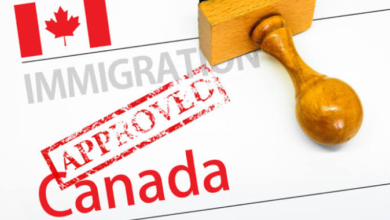How To Apply For Travel Loans and Grants To Relocate To Canada
Moving to Canada can be an adventure, but it can also be a very expensive one. The expenses can vary from flights to visas to accommodation to general living costs. If you are worried that you don’t have the financial capacity to deal with this, then there is a way out! Travel loans and grants are a way to make your dream a reality without breaking the bank. While travel loans and grants can help bridge the gap between where you are and where you want to go, the application process can be overwhelming. In this article, we’ll walk you through the steps to apply for travel loans and grants so you’re able to successfully make the transition to your new life in Canada.
About Travel Loans and Grants to Apply to Canada
Travel loans and grants are simply financial instruments designed to cover travel costs. Travel grants are non-repayable monies given to people or groups for specific goals. These grants are usually given by universities, ministries of education, non-governmental organizations or private organizations, and you have to apply for them through formal channels. On the other hand, travel loans are repayable funds that you get from a bank, credit union or an online lending service to finance your personal travel, an emergency or tuition fees for studies abroad.
These are repaid with interest, advanced for a finite period, and are based on the creditworthiness of the applicant. Noteworthy, grants are better suited for educational or professional travels since they don’t need to be repaid, but loans are useful in cases where the borrower has a sound plan of repaying. At the end of the day, both means are great but it all depends on your situation at the moment.
Programs and Institutions that Offer Travel Loans and Grants to Immigrants in Canada
1. Educational Institutions
Travel loans and grants are usually given to international students who are moving to Canada to study at Canadian educational institutions. With these financial aids, tuition fees, travel, and living costs are covered, making higher education in Canada more accessible to students from all over the world.
Also, scholarships, bursaries and grants are available from institutions like universities and colleges, according to academic merit, financial need, or particular criteria peculiar to the student’s field of study. The purpose of these programs is to attract talented students and provide them with a means of support during their educational journey in Canada, creating a diverse and inclusive academic community.
2. Cultural and Personal Enrichment Programs
These programs are designed to promote cultural exchange and personal development. Grants are often made available by these programs to people who intend to relocate to Canada in order to work on cultural, educational or community-based projects. The grants will cover travel expenses, accommodation and project-related costs.
For example, grants are provided by the International Experience Canada (IEC) program to individuals who participate in cultural exchange programs, internships and volunteer opportunities in Canada. The IEC program seeks to enhance cross-cultural understanding and to give participants experiences which will help them grow personally and professionally.
3. Global Talent Visa
The Global Talent Visa is meant to draw in highly skilled workers to Canada. The program provides fast processing and financial assistance to people with specialized skills in areas like technology, engineering and science. With the Global Talent Visa, talented professionals can relocate to Canada with ease at no cost.
The Global Talent Visa is only available to applicants who show the expertise and potential impact of their work in Canada. Through the program, travel expenses, visa fees, and initial set-up costs are taken care of so that highly skilled people can make a seamless transition to their new roles.
4. Charity Organizations
Numerous charitable organizations offer various forms of assistance to individuals and families settling in Canada. Typically, they may deal with the problems of refugees, poor families, and any such individuals who need help in this regard. These organizations have offered grants for airfare, housing, and basic living expenses. Particularly, the Refugee Resettlement Assistance Program is one of the organizations that assist refugees in resettling in Canada. It gives grants and support services to refugees coming into Canada. The program pays for the airfare to Canada, temporary accommodation, and basic needs, thus ensuring a safe and reasonably stable beginning for the refugee.
5. Government Assistance Programs
Numerous government assistance programs offer aid to new immigrants by covering expenses such as travel loans and relocation grants during the process of immigration in Canada. These assistance programs usually help refugees, skilled workers, and applicants seeking family reunification. For example, a very interesting one is the Immigration Loans Program (ILP), which provides loans to refugees and protected persons for transportation expenses to Canada, medical examinations, and travel documents. The ILP is designed to alleviate the financial hardship associated with relocation so that refugees and persons granted protection can better integrate into Canadian society.
6. Potential for Long-Term Prosperity
Programs targeting long-term prosperity provide funding to individuals who demonstrate potential for significant contributions towards Canada’s economic and societal growth. Such programs mainly serve entrepreneurs, innovators, and investors moving to Canada to start businesses or invest in local businesses. For instance, the Start-Up Visa Program offers grants and loans for entrepreneurs desiring to start an innovative business. It also provides monetary support for travelling expenses, setting up a business, and living expenses during an entrepreneur’s initial days when he/she starts in Canada.
7. Employer Relocation Packages
Many Canadian employers offer relocation packages with the intent of attracting international talent. These packages typically encompass financial assistance for travel, accommodation, and other relocation-related expenses. Employer relocation packages are generally accorded to skilled workers, executives, and professionals going to Canada for job opportunities.
Required Documents for Travel Loans and Grants in Canada
1. Proof of Identity
This is a strict but unavoidable part of the loan application process and is done using various forms of government identification. These may include:
- An International Passport which is usually the main document to be provided since it shows both citizenship and identity. This document is very reliable for verification processes.
- A National ID Card which can also be produced since it highlights important details such as your name and nationality.
- A Driver’s License, which can also be accepted to verify identity details as provided by the loan application.
Not only do these documents reaffirm one’s identity, but they also assure the lender that your details are verified. You can choose any one of the above-mentioned IDs as long as it is current and not expired.
2. Proof of Residency
Proof of your present address is yet another primary requisite to obtaining a loan or grant. This is because it shows that you reside in an eligible jurisdiction for the loan or grant application. To prove your place of residence, you may provide:
- Utility Bills which are a standard form of address verification. These can include electricity, water, waste management, or cable bills issued within the last three months before submitting your application.
- Bank Statements, which may be used for residency proof if they show the current address and are fairly recent.
- If you are a tenant, a Tenancy Agreement which can be acceptable provided it is up to date.
- An Insurance Card with your address clearly shown.
3. Proof of Funds
It is essential for any applicant to prove their financial stability if a travel loan is to be secured, and the lender must have the assurance that there will be prompt repayment of the requested loan amount once in Canada. To prove this, you may provide:
- A current Employment Letter detailing your employment status along with such other information as your position, salary, and duration in that position.
- Most recent one to three months’ Salary Payslips as this will also help to prove your regular flow of income, letting one reflect on the financial balance.
- Income Tax Statements which provide further evidence of income through one’s tax contributions.
How To Apply For Travel Loan and Grant To Relocate To Canada
1. Check your Eligibility
The first step is to check in detail which grants or travel loans you are eligible for. Each type of grant and travel loan has its criteria but must generally consider such factors as citizenship, employment status, and the reason for your relocation etc. Ensuring that you meet these criteria before you start the application process will save time from filling out applications that will be turned down. Other eligibility requirements may include academic qualifications or a detailed relocation plan.
2. Gather the Required Documents
Now that you are aware of the programs that are applicable to you, it’s time to prepare other documents. As mentioned earlier, such documents usually include personal identification papers, proof of income, bank statements, and a comprehensive plan on why you wish to relocate and how you are going to spend the money.
In addition to these documents, you may have to submit recommendation letters, a CV, and evidence of any debts or financial commitments you may have. Hence, you must prepare yourself adequately in order to fast-track the entire application process and to show the funding agencies that you are well prepared.
3. Apply for Various Loans and Grants
Your chances of getting a loan or grant would be increased by applying to many programs. Each program has its own selection criteria, and the processes involved in applying to them differ. Hence, sending out multiple applications might increase your chances of getting a grant or loan. Noteworthy, keep track of the application deadlines, and tailor each application to meet the requirements of the selection requirements of each program.
Furthermore, applying to multiple programs requires attention to detail in terms of meeting all deadlines and providing the most current information on every application. You might need to create a checklist or use project management software to track your progress and ensure you submit everything timely.
4. Don’t Try to Figure it Out Alone
Applying for travel loans and grants can be challenging, but you do not have to figure it all out alone, as professionals in this area may help you fix your application problems. Be on the lookout for immigration consultants, financial advisors, or legal experts so you can get insights on how exactly to put together a great and ready application.
5. Apply Early
Submitting your application early can give you an edge over your competitors. Usually, most programs have little funding available, but early applications increase one’s chance of getting funding before the resources run out. Besides, early submission shows seriousness and commitment to the whole process. This also gives you a little time to take care of anything that might come up during the application. For instance, if there is something additional to submit or if the application has errors, you can quickly correct it because you have sent your application early.
6. Always Follow up
After submitting your applications, be sure to follow up with the funding agencies. This demonstrates enthusiasm and commitment to your relocation plans. Enquire politely about the status of your application and be ready to submit any additional information or documentation requested. Following up also allows one to remain informed about any new directives, changes, or updates regarding the application process. This also shows a proactive effort on one’s side to stay in touch with the funding agencies, thereby enhancing the probability of a positive outcome.
Conclusion
Moving to Canada can prove to be very exhilarating. Hence, the importance of being able to access the right financial support in such situations cannot be downplayed. In this post, we have given you a guide on how one can apply for travel loans and grants as an immigrant to Canada. Don’t forget to read the eligibility criteria carefully, follow instructions and submit your applications with confidence. Once you have done all you know how to do, just believe that all will fall in place and your goal to move to Canada will be achieved.









